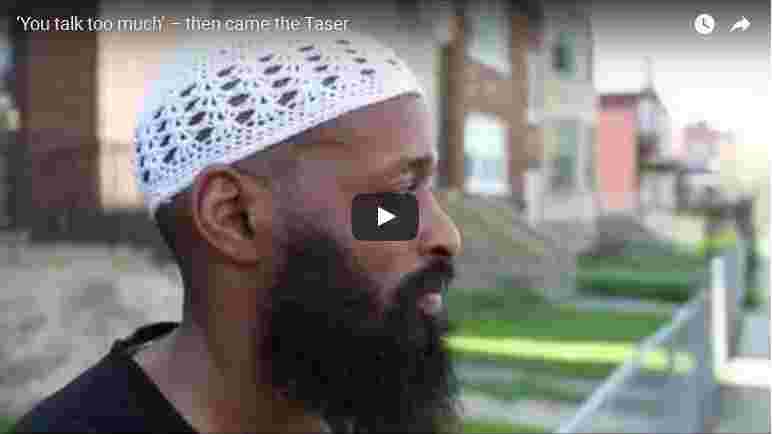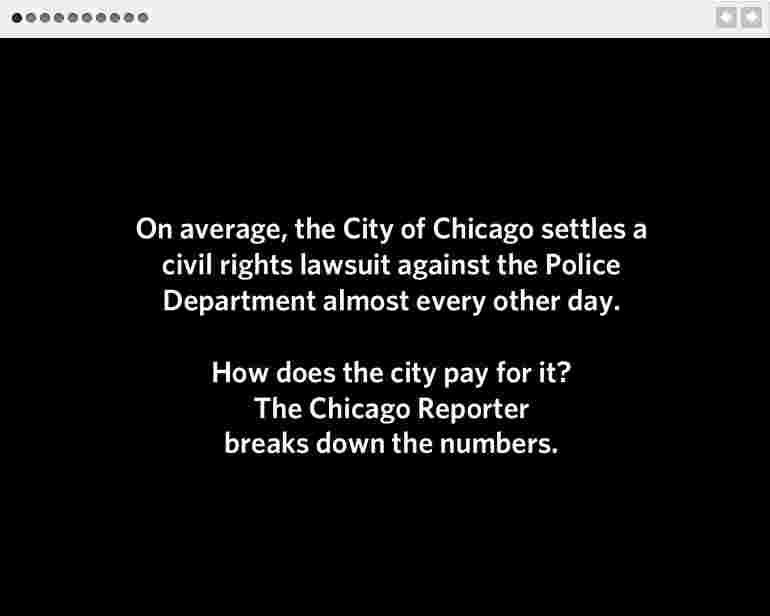Chicago Does Little to Control Police Misconduct - or Its Costs
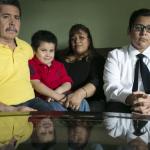
The stories behind Chicago's police settlements often begin in ordinary moments. Riding a bike. Attending a barbecue. Watching TV.
They often end in extraordinary circumstances, according to the lawsuits. An 11-year-old with a gun placed at her temple. A grandmother arrested for battery to a police officer. A young man shocked unconscious by a Taser.
Most of these cases conclude as they occurred - outside of the public glare. People know about the high-profile police shootings of civilians and the multimillion-dollar settlements that result. But most cases are lesser known and settle for far less. Half of all cases paid out $36,000 or less, but they also contribute to a mounting taxpayer bill that goes largely unchecked by the mayor or City Council.
The City of Chicago spent more than $210 million for police misconduct lawsuits from 2012 to 2015, according to a Chicago Reporter analysis. It spent almost $53 million more on outside attorneys to litigate the cases. The Police Department exceeded its annual budget for lawsuits by almost $50 million, on average, in each of those years.
Yet, unlike some other major cities, Chicago doesn’t analyze the lawsuits for trends, identify the officers most frequently sued, or determine ways to reduce both the cost of the cases and officer misconduct.
Rather than rein in the practices that lead to these settlements, officials have borrowed millions to pay for police lawsuits, adding to the city’s crippling debt. Over time, the interest on the bonds will more than double the cost for police misconduct.
To analyze the settlements, the Reporter built a database of the 655 police misconduct lawsuits that paid out from 2012 to 2015. (Click here to read the methodology.)
Some findings confirm public perceptions about policing. Latinos and blacks are disproportionately represented in the lawsuits. More than half the lawsuits allege false arrest. A tiny cohort of officers are defendants in multiple lawsuits.
But other patterns gleaned from the lawsuits indicate that police misconduct extends beyond a few “bad apples” to department-wide practices.
- In the small fraction of cases where officers and the city admit liability, the officers rarely are disciplined.
- Nearly half of the lawsuits claim that officers filed false reports—and sometimes committed perjury on the witness stand—to cover up their misconduct.
- More than one-quarter of lawsuits allege that two or more officers conspired to violate a person’s civil rights. Nearly one-third allege that some officers on the scene could have but didn’t intervene to prevent misconduct.
- In one-quarter of excessive force lawsuits, the person who alleged police abuse was also charged with either resisting arrest or assault of a police officer.
- One in 10 cases involves minors. Officers have pointed guns at children, shot at teenagers and left toddlers alone while their parents were arrested.
- Roughly 1 in 6 cases alleges that an incident is part of a pattern of misconduct, fortified by specific Police Department policies or the city’s general failure to adequately investigate officer misconduct. The city usually successfully argues to dismiss these claims, or to separate them from particular claims about the incident. That means the city's policies and practices are rarely adjudicated.
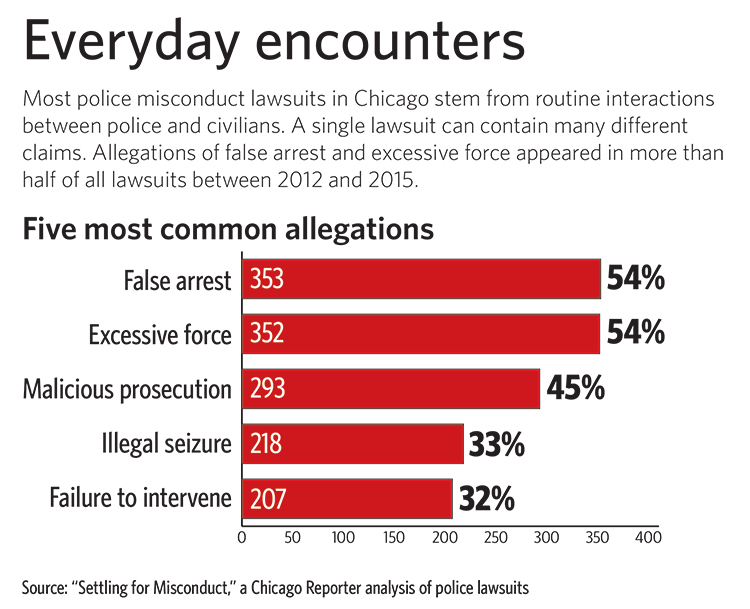
The law department settles 86 percent of all police misconduct lawsuits that result in a payout, according to the Reporter’s analysis. City officials are quick to point out that a settlement is not an admission of guilt.
“Our decision to settle a case is not a determination that we think the officer did something wrong or a recommendation about discipline,” Jane Notz, first assistant corporation counsel, told aldermen at a finance committee hearing last month.
But the burden of filing a lawsuit, including more than $350 in filing fees in federal or county court, can be significant and the chances of actually receiving money are about 50-50. About half of all police misconduct lawsuits filed against the city since 2007 were either thrown out or decided in favor of the city, according to an analysis of data provided by the city through a Freedom of Information Act request.
The Reporter’s analysis focuses on the other half—the cases that were settled or were decided in favor of the plaintiff.
Cities that don’t thoroughly examine those lawsuits are missing a chance to prevent the underlying causes of police misconduct, experts say.
“They’re losing the opportunity to draft new training that will help officers avoid situations that give rise to substantial liability,” said Merrick Bobb, a national expert in police accountability. “They’re losing the opportunity to identify those officers who present a greater risk of misuse of force than other officers.
“And, perhaps most important of all, they are losing the opportunity to establish mutually trustful relationships between the community and the police.”
***
Bloody violence follows request to see warrant
For Alfonso Cavada, talking about the night five years ago when police raided his home is cathartic. For his wife, Patricia, it is reliving a nightmare.
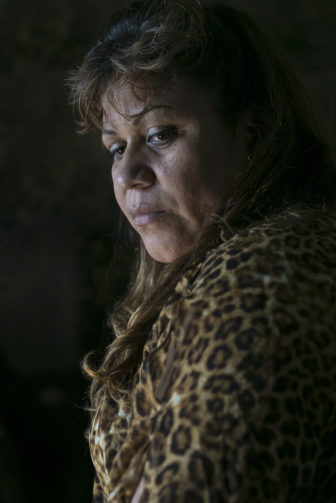
Photo by Michelle Kanaar
Patricia Cavada
Their lawsuit and subsequent interviews tell a harrowing story. The couple was awakened shortly after midnight by fierce knocking outside their modest house near Midway airport. Patricia had just given birth to their youngest son, Michael, a month earlier. She was still recovering from the cesarean section.
Ricardo, her 20-year-old son from a previous relationship, answered the door to find a dozen police officers, dressed in all black, surrounding the house. When he asked the officers to show him a warrant, they grabbed him, pulled him outside and hurled him against a fence, the lawsuit states.
The officers ordered Patricia and Alfonso outside, where the temperature on the mid-April night was just a few degrees above freezing. Alfonso didn’t have time to put on a shirt or shoes. He watched as the officers pulled Patricia down a half-dozen stairs. Alfonso said he tried to tell the officers about his wife’s recent surgery, but they ignored him. Officers pushed Patricia to the ground and pressed a knee into her back as they handcuffed her.
Alfonso, 50 years old at the time and 5 feet 5 inches tall, said he tried to get between the officers so he could get their attention, all along begging them to let go of his wife. Instead, one of the officers threw him onto the hood of his neighbor’s car, splitting open his lip. Blood gushed from his face and onto the ground, he said.
The officers brought Alfonso inside to the bathroom, where they tried to clean his lip and the blood that was now dripping on the floor, he said.
Another officer pushed Patricia, who was still handcuffed, toward the house, and she fell, hitting her eye on the doorknob.
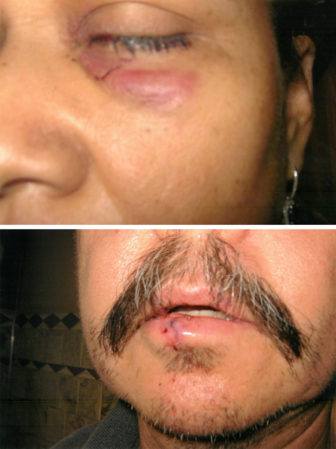
Courtesy Alfonso and Patricia Cavada
Photos from April 21, 2011 show the injuries Alfonso and Patricia Cavada suffered in their encounter with a dozen Chicago police officers.
When Alfonso saw his wife’s swollen eye, he started cursing and yelling in English and Spanish.
“Why are you doing this to my family?” he screamed at the officers. “Why did you hit a woman that just had a baby? What kind of man are you?”
It soon became clear that the officers were looking for Patricia’s other son, Julio, who was not at home. He had been living with his girlfriend for at least a year. The police apparently wanted him on suspected weapons charges, but a photo they had that apparently showed him holding a gun was more than a year old and was not taken at their house, the Cavadas said. Court records show Julio was never charged with a gun crime.
But officers charged Patricia and Ricardo with resisting arrest and Alfonso with resisting arrest and assault of a police officer. They were taken to a hospital and then to a police station. Without the Cavadas’ permission, officers left their one-month-old baby and 9-year-old son at the house in the care of relatives who were staying in their basement, they said.
On the way to the hospital, Alfonso talked back to the officer who was driving him. It was a shame, Alfonso grumbled, that his house didn’t have cameras to capture the officers’ behavior.
“If you had, we would have taken them,” the officer said, according to Alfonso.
The Cavadas said they returned home in the morning to emptied drawers, clothing spread across the floor and their son’s broken video game player. The warrant they had repeatedly asked to see was sitting on the kitchen counter.
Alfonso wanted the officers responsible to be fired. He called a reporter from Univision that morning, and he and his wife told their story on camera. Then they filed a complaint with the Independent Police Review Authority (IPRA), the agency responsible for investigating the most egregious complaints against officers. And, when they still hadn’t received a response from IPRA almost two years later, they filed a civil lawsuit.
Less than six months after the Cavadas filed their lawsuit, the city attorneys who were representing the officers came to them with a rare offer. The officers would agree to have judgment taken against them. It’s the civil law equivalent of a guilty plea, and it happens in fewer than 5 percent of police misconduct cases the Reporter analyzed. The Cavadas accepted the offer; the city paid Alfonso, Patricia and Ricardo $40,003, to be split among them. The city also paid their attorney’s fees.
Despite legally admitting wrongdoing, the officers weren’t disciplined and paid no money out of their own pockets.
In April 2015, four years after the Cavadas filed their complaint with IPRA, they received a letter. Their incident was marked as “not sustained.”
Even in the small fraction of cases like the Cavadas, where the city admits that the officers are liable for violating someone’s civil rights, the Reporter found that IPRA almost never finds the officers responsible.
The Reporter identified 151 officers named in 26 civil lawsuits in which officers admitted wrongdoing and made an offer of judgment. IPRA opened investigations in just nine of those cases, according to a Reporter comparison of lawsuits to agency records and incident dates.
Of those, only one officer was found responsible for misconduct by the oversight agency. He was Detective Dante Servin, whom IPRA recommended be fired for shooting Antonio Cross and killing Rekia Boyd while off duty in 2012. (He resigned in May, two days before a Police Board hearing was set to begin to consider IPRA’s recommendation.)
A spokeswoman for IPRA noted in an email that the factors considered in determining civil liability are different from those considered by IPRA, which is charged with determining whether an officer violated the Police Department’s internal policies.
For the Cavadas, that distinction doesn’t change the fact that the officers who hurt them were never held accountable or the feeling that the system is stacked against them.
“There is no justice here,” Alfonso said. “That is what we want, justice. But there was no justice.”
***
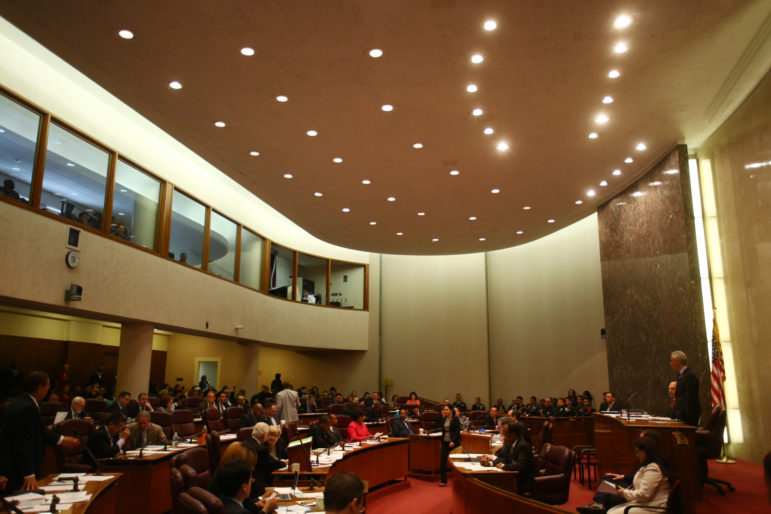
Photo by Grace Donnelly
The Chicago City Council held its' first meeting with newly elected members at City Hall on May 20, 2015.
No appetite for scrutiny or accountability
If Mayor Rahm Emanuel and the City Council wanted to address two of Chicago’s pressing issues — trust in the police and a growing debt burden — taking a close look at police misconduct lawsuits would be a logical place to start. It is where misconduct transforms from a policing issue that affects some Chicagoans into a fiscal issue that affects them all.
Analyzing police lawsuits for patterns that could be addressed through policies or training has been growing as a best practice among law enforcement agencies since the early 1990s, said Bobb. He was part of a commission that reviewed excessive force lawsuits against the Los Angeles County Sheriff’s Department. Following the commission’s 1992 report, that department became the first law-enforcement agency in the country to create a dedicated risk management bureau, which reviewed lawsuits for possible lessons that could reduce department’s liability costs.
Chicago, which spends more per officer on police misconduct lawsuits than any of the other largest police departments in the country, doesn’t do any kind of systematic trend analysis of police misconduct lawsuits, according to a report released in April by the mayor’s handpicked police accountability task force.
Information from civil lawsuits “has largely been untouched by the various oversight entities,” the task force found. “This represents a significant missed opportunity to ensure accountability.”
A patchwork of different departments, City Council committees and agencies in Chicago touch police lawsuits in some way. The Police Department is notified when an officer is named in a lawsuit. Attorneys from the law department represent officers and negotiate the terms of settlements. Aldermen on the finance committee have to approve settlements of $100,000 or more before they are voted on by the full City Council. IPRA is notified after a lawsuit settles, so its investigators can decide whether to open a new investigation into an officer’s conduct. The finance department cuts the checks.
None of them comprehensively analyzes data on the lawsuits.
In New York City, the analysis of police misconduct lawsuits is done by the department that holds the city’s purse strings. The comptroller started a program two years ago to analyze the thousands of claims received by the city each year, police-related and otherwise. When Chicago’s inspector general, Joseph Ferguson, heard about the program, called ClaimStat, in October 2014, he reached out to Chicago’s finance department to see if they did anything similar. They didn’t.
So he set about researching what it would take to start a claims analysis program in Chicago. A March 2015 memo from his office to the Chicago comptroller’s office outlined a plan for a pilot program modeled on New York’s, which would look at all claims paid by the city, including police misconduct lawsuits. The pilot was supposed to be completed by June 2015.
A year later, the finance department has nothing to show for it. A department spokeswoman said the Office of Inspector General would be releasing a report on the claims analysis program in the coming months, but she wouldn’t provide more details.
In Philadelphia the city’s attorneys, who litigate police lawsuits, also look for patterns and recommend policy changes based on lawsuits. But Chicago’s law department doesn’t have a systematic way to do that.
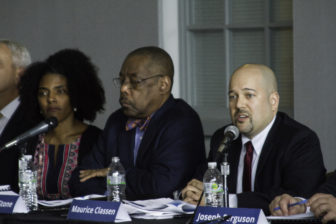
Photo by Stacey Rupolo
Maurice Classen announces the findings of his working group, which focused on legal oversight and accountability, at a Police Accountability Task Force news conference.
The inspector general found part of the law department’s case management system to be “incomplete and inconsistent.”
“There are folks in the law department who see the same names and the same trends popping up, but they don’t necessarily share that with other people in a systematic way,” said Maurice Classen, a program officer at the John D. and Catherine T. MacArthur Foundation, who was a member of the mayor’s task force. “It’s piecemeal.” (Disclosure: The Reporter receives funding from the MacArthur Foundation.)
A law department spokesman said its attorneys occasionally identify patterns in lawsuits and bring them up in meetings with the Chicago Police Department. But he also passed the buck.
“CPD and IPRA are the city departments that are primarily responsible for analyzing lawsuits and other data to identify patterns and trends that could lead to policy or training changes,” wrote Bill McCaffrey, the spokesman, in an email.
According to the task force report, the Police Department’s Office of Legal Affairs sends a memo to senior command staff each quarter listing all of the officers who were named in a new civil lawsuit. But “no action is sought or required,” according to the report.
This is a mistake, according to the task force and police accountability experts.
“They should be doing a careful analysis of all the cases that have significant settlements or that went to trial and lost, and try to decide why they had gone that way,” Bobb said. “At each point that an officer is making a decision, (they should) determine if there were alternatives at that point that could have been employed that would have led to the arrest of the suspect but a lower chance of excessive force.”
The police task force recommended that the mayor create an Inspector General for Public Safety, whose job would include analyzing police misconduct lawsuits for trends and reporting on those trends to the City Council before they vote to approve a settlement.
So far, the mayor has ignored that recommendation.
***
‘You talk too much’ – then came the Taser
If the city looked at police misconduct lawsuits for patterns, they would see a lot of cases like Gregory Lester’s.

Photo by Michelle Kanaar
Gregory Lester
It started on a warm summer night in September 2010. Lester was riding a bike from his uncle’s house to his grandmother’s in the Greater Grand Crossing neighborhood. He said he was doing a favor for his brother, who had borrowed the bike and asked Lester to drop it off at the grandmother’s home. The distance between the two houses is just two and a half blocks.
According to Lester, a police cruiser nearly ran him off the road. He had to jump off the bike to avoid getting hit.
A female officer called out the window, telling Lester to come toward her.
“For what?” he said. “I haven’t broken any laws.”
Officer Priscilla Hernandez didn’t answer him, she just kept ordering Lester over to the cruiser.
When he didn’t, she got out of the squad car and walked toward him. He continued to ask why he was being stopped.
“You talk too much,” she said.
Hernandez grabbed his wrist, Lester said. Instinctively, he pulled back.
“Don’t touch me,” he said.
Hernandez’s partner, Daniel Cravens, ran up to him from the side and fired his Taser into Lester’s chest.
“It’s like your system shuts down,” said Lester of the Taser shock. “You don’t feel anything at the moment, everything just goes blank.”
The Reporter found at least 37 lawsuits like Lester’s, out of the 655 analyzed, where the interaction started when the officer allegedly stopped someone on the street without justification. These cases cost Chicago taxpayers $2.5 million between 2012 and 2015.
Lester passed out from the shock of the Taser. He came to in the back of the same police car that had nearly run him over, a sharp pain in his chest. He was sure the officers would soon realize they had made a mistake and let him go.
Instead, when they got to the police station, Cravens mocked Lester. “Man, it didn’t hurt that bad, I’ve been Tased before,” Lester recalled his saying. Cravens joked with his colleagues about finally getting the chance to use his Taser, the lawsuit states. Cravens could not be reached for comment. Hernandez declined to comment.
Lester was charged with aggravated assault to a police officer and resisting arrest, even though there was no charge to justify the original stop and neither of the officers reported any injuries. The arrest report says simply that Lester was “causing a disturbance in the street” and that he became “agitated and aggressive” when Hernandez called him over to the cruiser. The officers said Lester pulled away from Hernandez, squared his body against Cravens, clenched his fists and stepped toward Cravens, saying, “You’re dead.”
Lester laughs at the police account.
“This was something they totally created,” said Lester, now 33. “It was a beautiful story, actually — I would go see a movie about it,” he added, sarcastically, “but that’s not what actually happened.”
Lester’s accusations are common. Twenty percent of lawsuits that allege excessive force also note that the victim was charged with assault or battery to a police officer. The charges are almost always dropped, as Lester’s were.
“Everybody in the history of the CPD who has ever been injured by a police officer is always charged with a crime,” said Michael Robbins, one of the attorneys who represented the family of Laquan McDonald, the teenager shot 16 times by a Chicago police officer. “It’s just common procedure. The charge goes hand in hand with the use of force. And it’s the justification for the force more often than not.”
The Reporter found other patterns:
- Of the 41 lawsuits about police-involved shootings, four of them occurred after officers chased a suspect on foot into an alley, gangway or stairwell. IPRA noticed this trend in its 2008-09 annual report, and recommended that officers receive better tactical training on how to avoid putting themselves in these situations. These cases cost taxpayers $5.6 million.
- At least 36 lawsuits stemmed from arrests on drug charges that were ultimately thrown out or not sustained at trial, often because there wasn’t justification for the officers to conduct a search. These cases cost taxpayers $1.6 million.
- At least 19 lawsuits arose out of situations where officers executing a search warrant searched the wrong house or apartment. These cases cost taxpayers almost $840,000.
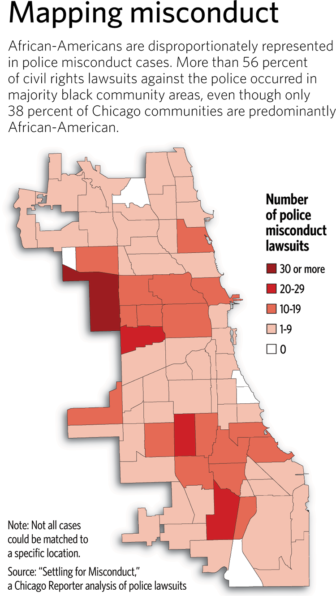
The Reporter also found that 75 percent of the incidents whose location was listed took place in Census tracts that are majority black or Hispanic. Fewer than 60 percent of census tracts in the city are majority black or Hispanic.
The Police Department did not respond to the Reporter’s questions about these patterns.
Torreya Hamilton, a civil rights attorney who has also worked in the city’s law department and the Cook County State’s Attorney’s Office, was not surprised.
“There’s clearly a different Constitution being employed in poor neighborhoods where most of the people are black and brown than in our white neighborhoods,” she said. “On an absolute regular basis police are stopping and searching people of color in this city with no legal justification to do it.”
It took almost a year of court appearances before the charges against Lester were dropped, which exacted an emotional toll on him.
“I almost became a recluse,” he said. “I stayed inside. I wanted to avoid the police at all costs.”
After the criminal case against him ended, he filed a civil lawsuit. A year later, he settled for $50,000.
***
Taxpayers on hook for high-interest borrowing
Rather than look for ways to cut down on police misconduct — and the lawsuits that result from it — the mayor and City Council have repeatedly chosen to kick the can down the road, adding significantly to the financial burden of police abuse.
Every year, the City Council sets aside $20 million in the police department’s budget for misconduct settlements and the legal fees that come with them. And every year, the police department blows through its allocation.
When that happens, the city directs some money from a pot in the general fund that is set aside for legal settlements to pay for police misconduct lawsuits. It also looks for extra money from the operating budget, and directs that to pay for settlements and judgments. But that usually isn’t enough either.
How does Chicago pay for lawsuits?
So the city borrows money through long-term bonds to pay the difference. On average, 61 percent of the costs of all city lawsuits have been paid through bonds since 2005. This includes police and non-police cases, but police lawsuits make up 60 to 70 percent of all settlement and judgment costs in the city each year.
Borrowing to pay for lawsuits more than doubles the cost to taxpayers for these settlements. For example, in 2014 the city issued $450 million in bonds of which $198 million was earmarked for two years of settlements and judgments. With its low credit rating, the city had to pay 6.3 percent annual interest, significantly higher than top-rated bonds.
By the time the bond matures in 2044, taxpayers will have shelled out approximately $335 million in interest payments, bringing the total cost of these settlements and legal fees to more than $530 million.
That means even if the city found a way to eliminate police misconduct tomorrow, Chicagoans would still be paying hundreds of millions of dollars for police abuse for generations to come.
Municipal finance experts say paying for one-time expenses like a lawsuit settlement with long-term borrowing is not only bad fiscal policy, but also bad for accountability.
“Management of the claims against the city would be far less costly if they were paying it through the operating budget, rather than borrowing,” said Laurence Msall, president of the non-partisan Civic Federation, which analyzes government finance issues in Chicago.
Borrowing to pay for settlements also allows departments to avoid addressing the underlying causes of those settlements, because there are no repercussions for going over budget year after year, he said.
“There is less accountability and less corrective action that is taken when the departments where the wrongdoing is occurring are not required to take action to avoid it reoccurring,” Msall said.
The mayor has acknowledged that borrowing to pay for one-time lawsuit costs is not a best practice. In a speech at the Civic Federation in April 2015, Emanuel pledged to increase Chicago’s operating budget for settlements and judgments, so the city wouldn’t have to borrow quite as much. In his 2016 budget he followed through, adding $9 million more for lawsuits to the overall budget (though not adding anything to the police department’s lawsuit budget), bringing the total for all departments to $45 million.
If the last four years are any indication, though, that still won’t cover even half of the total cost of all lawsuits against the city. And it seems the Emanuel administration knows that. Last month, the mayor proposed another $600 million bond issuance, at least $100 million of which will go toward lawsuit settlements and legal costs for this year and next year.
At its May meeting, the finance committee approved the borrowing plan unanimously. At the same meeting, aldermen signed off on two more seven-figure settlements for fatal police shootings.
These two cases will be added to the 53 other misconduct lawsuits the city has paid out so far in 2016.
__________
Jonah is a reporter for The Chicago Reporter.
Click here to support the Chicago Reporter



